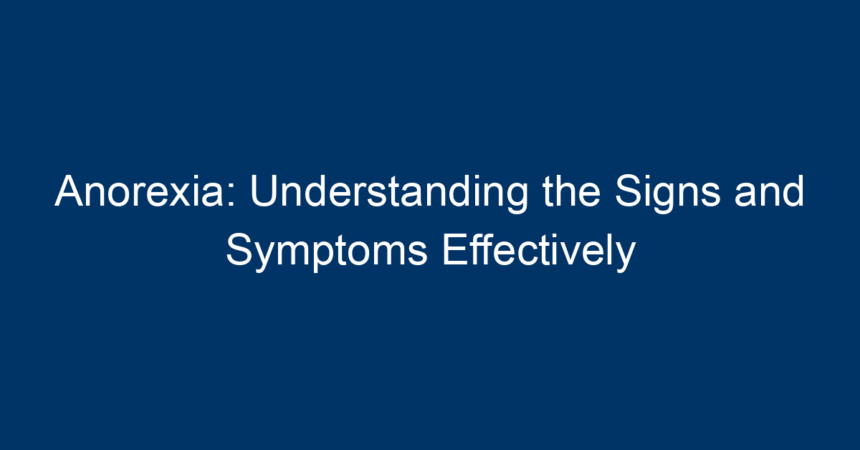Anorexia, clinically known as anorexia nervosa, is a serious eating disorder characterized by an intense fear of gaining weight, leading to excessive weight loss and a distorted body image. While many people may associate anorexia with extreme thinness, this disorder can manifest in various ways, affecting individuals of all ages and backgrounds. Understanding the signs and symptoms of anorexia is crucial for early intervention and treatment. In this article, we will delve into what anorexia is, its signs and symptoms, the causes and consequences, and how to seek help effectively.
What is Anorexia?
Anorexia nervosa is not merely about food; it is deeply rooted in psychological issues. Individuals suffering from this disorder often perceive themselves as overweight even when they are dangerously underweight. The drive for thinness can stem from various factors, including societal pressures, perfectionism, or underlying mental health conditions like anxiety or depression. This complex interaction makes recognizing anorexia essential for timely support and recovery.
Signs of Anorexia
1. Dramatic Weight Loss
One of the first and most noticeable signs of anorexia is significant weight loss. Individuals may drop weight rapidly and continually despite being below a healthy weight for their age and height. This drastic change can often be accompanied by a relentless pursuit of thinness.
2. Intense Fear of Gaining Weight
A hallmark of anorexia is an overwhelming fear of weight gain. This fear is irrational and persists regardless of how much weight an individual may shed. These fears drive individuals to engage in extreme dieting, excessive exercise, or other harmful behaviors.
3. Distorted Body Image
Anorexia often comes with body dysmorphia, where the individual sees themselves as overweight despite evidence to the contrary. This distorted self-image can perpetuate the cycle of unhealthy behaviors and contribute to low self-esteem.
4. Changes in Eating Habits
People suffering from anorexia frequently exhibit unusual eating patterns. This may include restrictive diets, skipping meals, and avoiding certain food groups. Often, they may also engage in obsessive calorie counting or adhere to highly structured meal plans that severely limit intake.
5. Emotional and Psychological Symptoms
In addition to physical signs, anorexia can lead to various emotional and psychological symptoms. These may include mood swings, irritability, anxiety, depression, or social withdrawal. Individuals might struggle to engage in normal social situations involving food, such as family dinners or outings with friends.
6. Physical Health Consequences
The physical ramifications of anorexia can be severe. Malnutrition can lead to a host of health issues, including weakened bones, heart problems, and electrolyte imbalances, which can be life-threatening. Other potential complications include hair loss, dry skin, and digestive issues.
Identifying Symptoms Early
Early recognition of the symptoms of anorexia is vital to preventing the disorder from escalating. Some warning signs that family and friends may notice include:
- Avoidance of social gatherings, especially those centered around food
- Excessive focus on weight, dieting, and food in conversations
- Changes in clothing style to hide weight loss (e.g., baggy clothes)
- Withdrawal from relationships and activities previously enjoyed
If these signs are evident, it’s essential to engage in conversations about concerns without judgment, encouraging the individual to seek professional help.
Causes of Anorexia
Understanding the underlying factors that contribute to anorexia can provide valuable insight into prevention and treatment. While the exact cause is complex, several elements can contribute to the development of this disorder:
1. Genetic Factors
Studies indicate that individuals with a family history of eating disorders may be at a higher risk of developing anorexia. Genetic predisposition may play a role in how one processes emotions and stress.
2. Psychological Factors
Mental health disorders such as anxiety, depression, and obsessive-compulsive disorder (OCD) frequently coexist with anorexia. These psychological issues can contribute to the development and maintenance of disordered eating patterns.
3. Sociocultural Influences
Society’s unrealistic standards of beauty, often portrayed in media, can amplify feelings of inadequacy and drive individuals to strive for extreme thinness. The pressure to conform to these ideals can be immense, especially among teenagers and young adults.
4. Environmental Triggers
Life events such as trauma, loss, or significant life changes (like moving to a new city or starting a new school) can trigger or exacerbate existing issues with food and body image. Support from family and friends is critical during these times.
Consequences of Anorexia
The consequences of anorexia extend beyond immediate health effects. Chronic malnutrition can lead to long-term physical and psychological issues:
1. Health Risks
The risks associated with anorexia include severe malnutrition, organ failure, and even death. It is imperative to address these health concerns promptly to reduce the risk of permanent damage.
2. Psychological Impact
The mental and emotional toll from anorexia can manifest as long-lasting anxiety or depression. Recovery from an eating disorder requires comprehensive therapeutic interventions, often involving both physical and mental health professionals.
3. Social Isolation
Anorexia can lead to social withdrawal, resulting in strained relationships with family and friends. Rebuilding these relationships is a vital part of recovery, as support systems play an integral role in healing.
Seeking Help for Anorexia
If you or someone you know is struggling with anorexia, seeking help is a crucial step toward recovery. Here are some actionable insights to consider:
1. Talk to a Professional
Consulting a healthcare provider or mental health professional specializing in eating disorders can help create a tailored treatment plan. An integrated approach that includes medical, nutritional, and psychological care is often the most effective.
2. Build a Support Network
Encourage open communication with family and friends. Support from loved ones can make a significant difference in recovery, providing the individual with a sense of belonging and understanding.
3. Educate Yourself
Understanding anorexia can demystify the disorder and alleviate stigma. Resources, books, and support groups can provide valuable insights for those affected and their families.
4. Focus on Self-Care
Engaging in self-care practices such as meditation, yoga, or creative outlets can be beneficial in promoting a healthier relationship with oneself. Learning to appreciate the body for its functionality rather than its appearance is crucial for recovery.
5. Patient and Compassionate Approach
Recovery from anorexia is often a long and challenging journey. Being patient and compassionate with oneself or the individual affected is vital. Small steps toward recovery can lead to significant changes over time.
Conclusion
Understanding anorexia—its signs, symptoms, and consequences—is fundamental for early intervention and support. By recognizing the warning signs and knowing how to seek help effectively, individuals and their loved ones can work together toward recovery. It’s essential to foster a supportive environment and maintain open lines of communication. Through education and compassion, we can combat the stigma surrounding eating disorders, empowering those affected to reclaim their health and well-being.
If you or someone you love is struggling with anorexia, take the first step by reaching out to a professional. Recovery is possible, and healing can begin.




